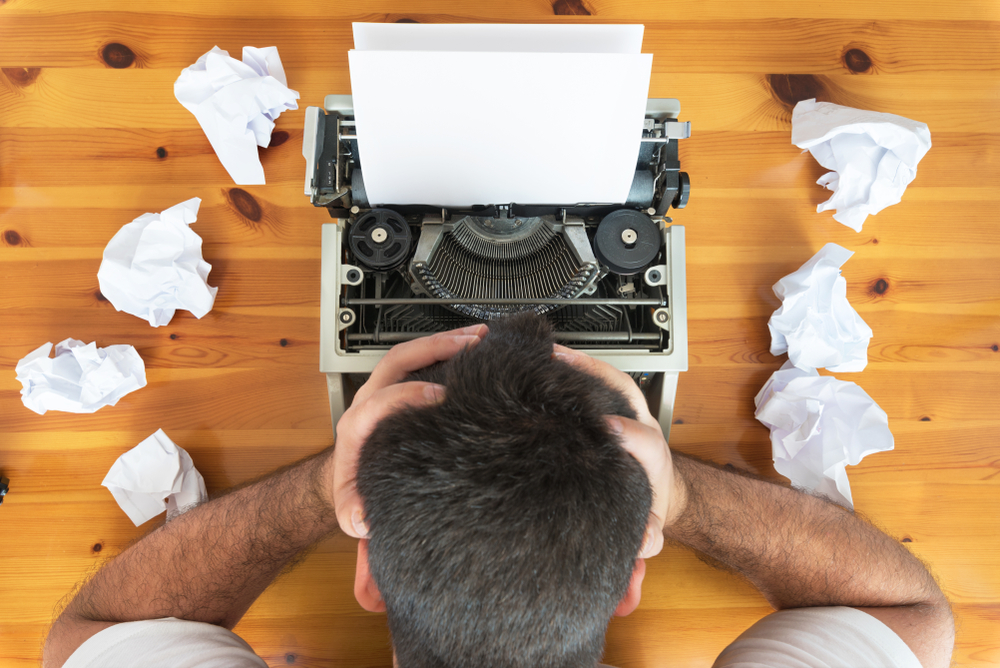How to overcome writers block for an essay

Whether you’re looking forward to it or not (and let’s be honest, you probably aren’t) – you’re going to have to write an essay at some point in your academic career. You could be in university, undertaking online courses, or even getting through your final months of Year 12; the intimidation of writing an essay is very much a real, and sadly, mandatory task for many of us.
To make matters worse, this horrid lack of motivation or fear of failure can result in a common phenomena that only digs an even deeper academic grave: the dreaded “writer’s block.”

What is “Writer’s Block”, Exactly?
Writer’s block is the feeling of a “creative blockage”; a mental barrier between you and your normally free-flowing ideas and inspiration. As a bit of historical trivia, the term itself was actually coined by a psychoanalyst named Edmund Bergler, who had studied writers and their productivity patterns for decades to find out what it was that caused their occasional inability to create.

He later affirmed in his 1950 paper titled “Does Writer’s Block Exist?” that a writer suffering from creative barriers is “blocked” psychologically – a condition that can only be “unblocked” via therapy.
While the remedies for writer’s block today do not necessarily have to be as extreme, there are thankfully a few ways to combat these occasional productivity jams, especially when you’re scrambling to turn in that 2,000-word assessment paper.
Overcoming writer's block in essays
- Create an Outline.
- Write in the Right Environment.
- Remove All Distractions.
- Get Up and Get Moving.
- Just Write, Imperfections and All.
1. Create an Outline.
Once you’ve collected the research you need to support your thesis, it’s helpful to start creating a skeleton of your piece by plotting out the main points you’ll be discussing. Putting together a research paper on why looking at cat GIFs can improve your productivity? Begin jotting down your strongest arguments as to why (ie. 1) They help relieve stress, 2) they provide humorous inspiration, 3) they’ll keep you in a good mood for the rest of the day), structuring these points in the order that works best for your essay.

Once you’ve gotten your main statements down – and remember, they don’t have to be written perfectly just yet! – start throwing in the facts, evidence, and statistics you need to back them up, inserting them as sub-points beneath each of these main arguments.
Once you’ve done that, you can go ahead and write up a strong, clear topic sentence for each main argument, and there you have it: a coherent, research-backed outline for your essay that’ll act as a guide for when ideas run dry.
2. Write in the Right Environment.
You’re not going to be able to write effectively in an area full of noise and frantic activity, so make sure you’re settled in a quiet, comfortable environment before attempting to write out your essay.

Creating the ideal physical space for your essay-writing can be as simple as turning on relaxing focus music, settling into a comfy chair and having a nice, hot cup of tea on the side of your desk as you work. Prep your surroundings in a way that promotes a calm mindset – making the act of writing your essay a little less of a daunting task.
For further tips on how to create the “perfect” study space to bolster your productivity and lessen writer’s block frustration, check out one of our previous guides on how to do just that.
4. Remove All Distractions.
Here’s a typical scenario: you’ve finally created a relaxing atmosphere for your essay-writing session, brewed yourself a nice cup of coffee and have the ambient sounds of waterfalls and bluebirds playing out on Spotify.
A blank word document is staring right at you from your laptop screen, and you’re just about to type out that perfect introductory paragraph… when suddenly, your phone starts buzzing with a new Facebook notification. Before you know it, you’ve spent about 30 minutes mindlessly scrolling through Facebook’s newsfeed after promising yourself “a second” to check out that message.
It’s easy to fall into the rabbit hole of internet distractions when faced with the mundane task of writing an essay, so it’s important to get rid of these sources completely before starting. There are several website blockers available to help prevent you from accessing websites that are sure to put a dent in your productivity, so if you’re one of those people constantly checking Facebook or surfing Youtube videos every ten minutes – definitely check them out! We’ve also covered a number of other mobile apps that can help you in times of study – whether you’re writing essays or otherwise.
Of course, distractions aren’t limited to the internet – there are plenty of real-life factors that can exacerbate your writer’s block, be it your kids, your husband’s football game, or your hyperactive dog begging you for another walk.
This links back to our second point – finding a proper, quiet environment for you to successfully do your work without unwanted interruptions.
5. Get Up and Get Moving.
Perhaps all your brain needs to combat the creative blockage is the opportunity to rest and recharge. It’s absolutely okay to take a break (just don’t overdo it!); and a good, ten-minute walk may be just what you need to de-stress your mental gears and have them rejuvenated by the time you return.

If you’re feeling a little more energetic, you can even try going for a quick run. By increasing your heart-rate with vigorous physical activity, you’re pumping more blood and delivering more oxygen to the brain, giving it the power boost it needs to get your ideas down on paper. As the philosopher Henry David Thoreau puts it, “the moment my legs begin to move, my thoughts begin to flow.”
Taking these productive breaks also gives your brain the space to naturally wander in free thought, allowing ideas and concepts to come to you more organically. The act of placing yourself under less mental pressure gives your mind the breather it needs to unclutter and plan things out more effectively. As tempting as it may be to scrape your brain for ideas, it’s important to not let it burn out.
6. Just Write, Imperfections and All.
It’s a cliché piece of advice, but one of the most foolproof ways to overcome writer’s block is to just write.
Simply force yourself to regurgitate whatever existing ideas you have in mind out in the open, and allow your writing to be bad if you must. You’ll have plenty of time to look over and edit your work later – but completing your essay starts by getting all your ideas and research out on paper. After that, you can go back and rework the imperfections; but you can at least rest easy knowing that you’ve manifested most, if not all, of your thoughts into written words. Once you’ve done that, you’ve won half the battle.
Sitting down to write an essay can be dreary task, and it doesn’t help when you’ve got a horrid case of writer’s block stunting your work’s progress. It’s something that all students are bound to face at some point, so you aren’t alone. Hopefully with these tips, you can successfully push through those mental barriers and churn out an excellently-written essay that’s sure to have you ace that assessment.
Ready to Start Studying?
Upskilled has a wide range of online courses that can help you acquire the qualifications needed for your industry of choice. The best part is, each one is provided with flexible delivery, allowing you to learn at your own pace, wherever you wish. Get started on your ideal course here.


)
)

